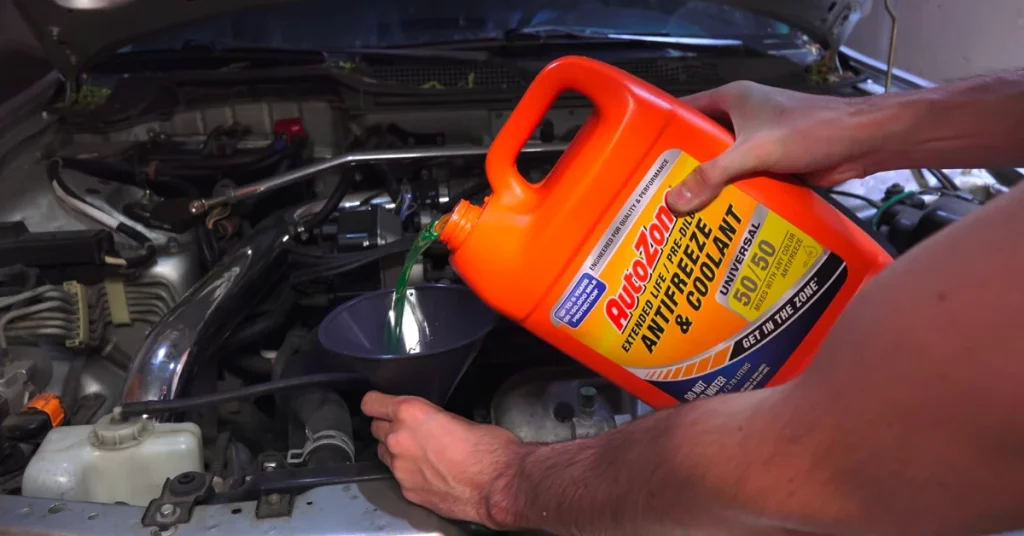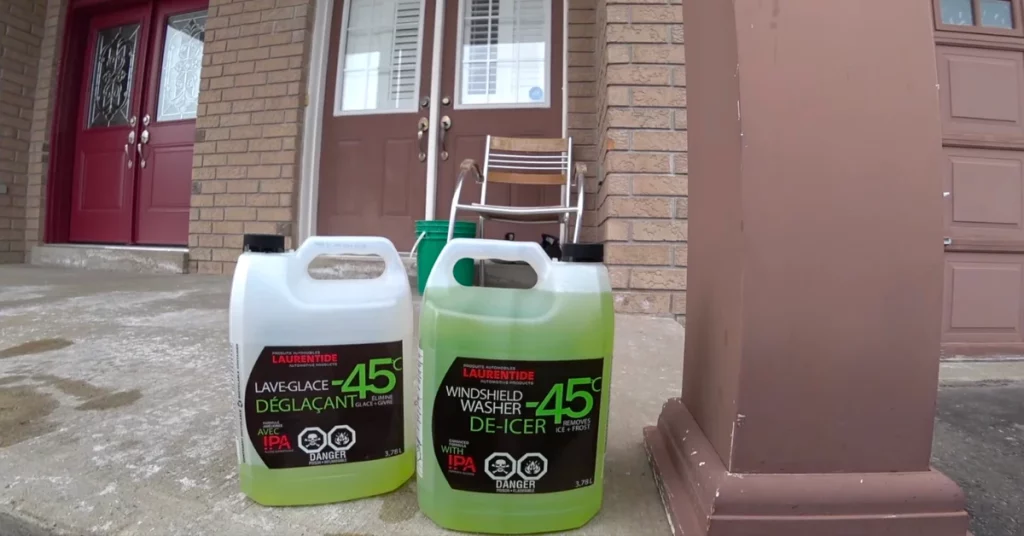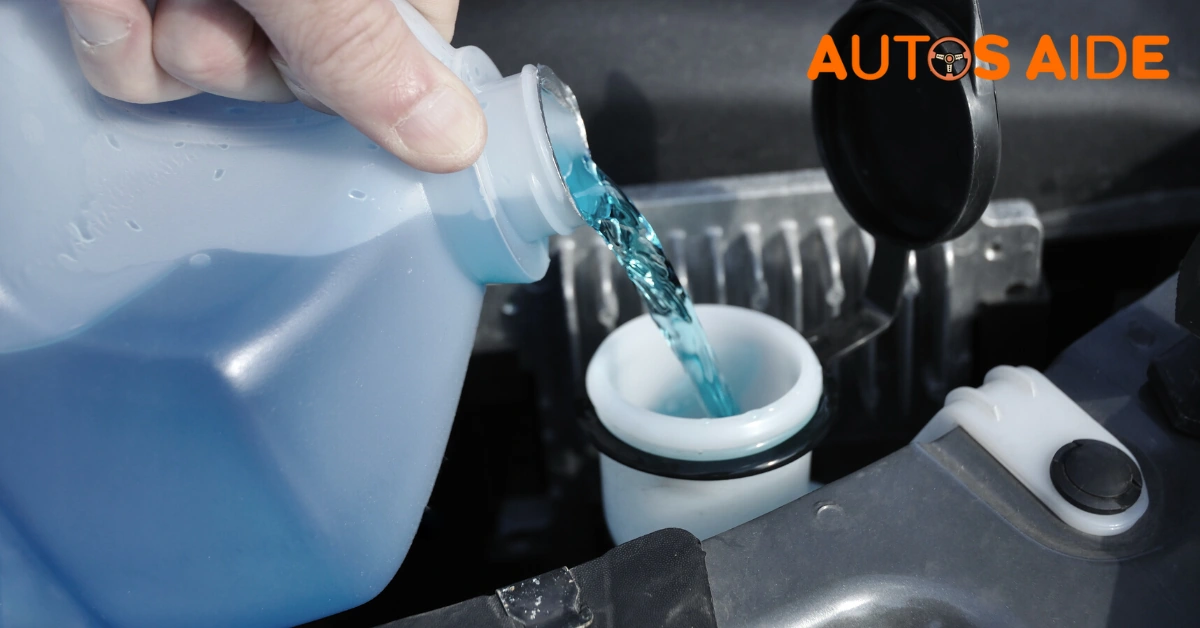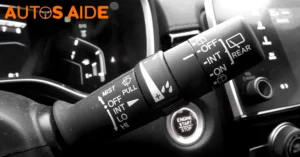Coolant, aka antifreeze, and windshield wiper fluid serve two different roles in a vehicle. But the tanks that contain them under the hood are pretty close to each other.
So, pouring coolant into the wiper fluid reservoir and wiper fluid into the coolant tank is a common mistake.
But is it a harmless error? How dangerous is it to use these two liquids as substitutes? Or do you have nothing to worry about?
I will try to explore the answers to these questions in my coolant vs. windshield wiper fluid breakdown.
Read More: How Do I Know If My Windshield Washer Pump Is Bad?
Coolant vs. Windshield Wiper Fluid: What Are They?
Before explaining why we should or should not use coolant and windshield wiper fluids as substitutes, I’d like to briefly discuss what they are and what they do in a vehicle. I promise that I won’t take long!
What Are Coolants Or Antifreeze?
Coolant is a liquid that you mix with water and put inside your engine. As the name suggests, coolants cool down the engine when the engine temperature exceeds ideal levels. It stays in liquid form even when the temperatures drop as low as 30°F.
Furthermore, the coolant prevents the water pump, head gasket, cylinder, and piston timing from being damaged by keeping them lubricated.

What Are Windshield Wiper Fluids?
Again, the name gives away the purpose. Windshield wiper fluid is a liquid that goes to the windshield washer reservoir.
Once the washer fluid button is pressed, the liquid travels through the windshield washer hose and comes out through the washer nozzles to splatter all over the windshield.
The windshield wiper fluids help to break down the dirt and grime that accumulates on the windshield over time. So, they are crucial in maintaining the windshield’s clarity.
Are Coolants And Wiper Fluids Interchangeable?
Now, let’s get to the question we asked at the beginning. Can you use coolants instead of wiper fluid, and vice-versa? The answer is a resounding no! If that’s all you wanted to know, there you have it! Interested to know why? Read on, then.
Why You Should Not Use Windshield Wiper Fluid Instead Of Coolant?
Windshield wiper fluids contain methanol and other chemicals. In some cases, there could be traces of ethylene glycol, which is also present in antifreeze. But the primary ingredient of windshield wipers is water. Usually, wiper fluids have as much as 90% water content.
So, why does this become a problem when you pour windshield washer fluid into the coolant reservoir instead of coolant?
Since coolants deal with extreme engine temperatures, they cannot have a high water concentration. You need to mix water with antifreeze in the radiator, but the ratio is usually 50-50 or 60% antifreeze and 40% water.
If the water presence is high in coolants, it will evaporate when the temperatures go high. It’s normal for engine temperatures to get between 200°F-220°F. If you recall your elementary school science lessons, you would remember that water begins to boil at 212°F.
So, most of the coolant will evaporate when the water concentration is high. That’s why you can’t put washer fluid into the radiator in place of coolant. It could damage the engine beyond repair.

Why You Should Not Use Coolant Instead Of Windshield Wiper Fluid?
What about the other scenario? Washing windshields seem like a far less technical job, right? So, how wrong could things get if you choose to use coolants as an alternative to regular washer fluid?
Coolants would be way more difficult to remove from the windshield because of their thicker consistency. Your wiper blades will have to go into overdrive, which might not be enough to get rid of all coolants from the windshield.
Also, coolants are far more abrasive than windshield wiper fluid because of their high chemical concentration. Your windshield might get damaged and if you spill some coolant on the car body, expect the paint job to get ruined. Doesn’t sound like much of a good idea, does it?
Read More: How To Reset Windshield Fluid Light?
Is Coolant The Same As Windshield Washer Fluid?
No, they are not the same. They might share some ingredients like methanol and ethylene glycol, but coolants are much thicker in consistency and have a lower water presence.
How Much Methanol Is In Windshield Washer Fluid?
The European Chemicals Agency does not allow the methanol concentration to go above 0.6% in windshield washer fluids. In non-EU markets, the concentration is higher. In the US, it’s about 3%-5%.
Can I use coolant as windshield washer fluid?
No, you cannot use coolant as windshield washer fluid. Coolant is designed for cooling systems and can be harmful if used in windshield washer fluid. It can also damage your car’s paint and windshield.
What do I do if I put windshield washer fluid in the coolant?
If you have mistakenly put windshield washer fluid in the coolant, you should drain the system and flush it with clean water. Afterward, you should fill the system with the appropriate coolant. It is important to note that mixing coolant and windshield washer fluid can cause permanent damage to your car’s cooling system.
Final Opinion
Coolant and windshield wiper fluid are completely different substances that serve other purposes and should never be mixed. Coolant, also known as antifreeze, is used to lower the freezing point of water and protect the engine from overheating. Windshield wiper fluid is designed to help clear away dirt, bugs, and other debris from the windshield for better visibility.
Mixing the two can have dangerous consequences and cause major engine issues. For this reason, it’s essential never to mix antifreeze with wiper fluid. Some products available on the market include antifreeze in their formulas, but it’s essential to follow the instructions on the package to avoid any problems.





